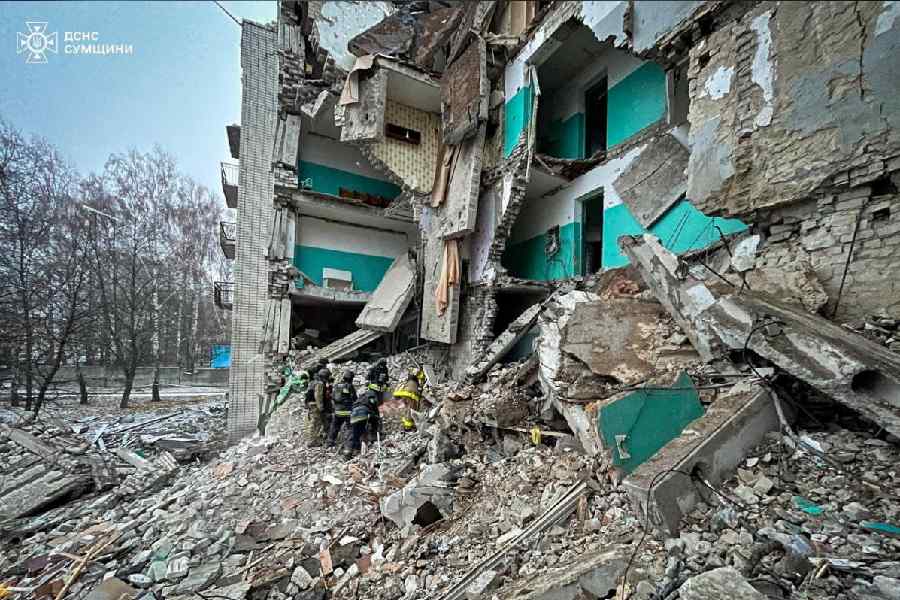The U.S. decision to authorise long-range Ukrainian strikes could help Kyiv defend the foothold in Russia's Kursk region that it seized as leverage in any war talks, but may come too late to change the course of the war, analysts said.
Two months before leaving office, President Joe Biden lifted some restrictions that have blocked Kyiv from using U.S.-supplied weapons for strikes deeper into Russian territory, in a major policy change, Reuters reported on Sunday.
Military analysts said the impact on the battlefield, where Ukraine has been on the back foot for months, would depend on what limits remained. But while the shift may shore up the Kursk operation, it was unlikely to be a gamechanger overall.
"The decision comes late, and like other decisions in this vein, it may be too late to substantially change the course of the fighting," said Michael Kofman, a senior fellow at the Carnegie Endowment for International Peace in Washington.
"Long-range strikes were always one piece of the puzzle, and had been overly freighted with expectations in this war."
There also is no way to know how long the new policy will last. It was criticised by Richard Grenell, one of the closest foreign policy advisors of returning president Donald Trump, who replaces Biden on Jan. 20. Trump has long criticised the scale of U.S. aid to Kyiv and has vowed to end the war quickly, without saying how. A Trump spokesperson did not immediately respond to a request for comment.
Ukraine has lobbied for the change for months, arguing its inability to hit areas inside Russia, and in particular military airbases hosting warplanes involved in strikes on Ukraine, was a major handicap.
Russian forces, which have been on the offensive for more than a year, have been advancing at their fastest rate since 2022 in eastern Ukraine and exerting pressure in the northeast and southeast.
Russia says Ukraine cannot fire the missiles at targets inside Russia without direct help from NATO allies, calling this a major escalation. On Monday, the Kremlin said any such decision would mean the United States was directly involved in the conflict.
The first Ukrainian strikes could happen in the coming days and are likely to be carried out using ATACMS rockets, which have a range of up to 190 miles (306 km), Reuters reported.
A central European defence official told Reuters the strikes would give Kyiv a greater chance to defend itself from aerial attacks, but would not decisively swing the conflict in Ukraine's favour.
Russia had already moved many of its air assets beyond the reach of Western weapons in Ukraine, the official said, although the range would cover beyond the area of Kursk occupied by Ukraine.
Lithuanian Foreign Minister Gabrielius Landsbergis said he was "not opening champagne just yet" as it was unknown how many rockets the Ukrainians had and whether they had enough to impact the battlefield.
The decision to authorise the strikes only after months of Ukrainian lobbying follows a pattern repeated throughout the war as the Biden administration tried to balance its support for Ukraine with concern about escalation.
Previously, Washington vacillated for months before approving giving Ukraine long-range missiles, tanks and planes.
Some military analysts say such delays gave Moscow time to recover from early failures and reinforce defences of occupied territory, contributing to the failure of a major Ukrainian counteroffensive last year.
UKRAINE UNDER PRESSURE
Being able to attack Russian territory with missiles could have its most direct impact in Kursk, where Ukraine aims to hold a salient it captured after its first major cross-border assault in August. The Russian land could be a bargaining chip in any negotiations after Trump enters the White House.
Kyiv says Russia has massed 50,000 troops to try to retake the territory in Kursk, and that it has deployed 11,000 North Koreans, some of whom it says have joined the fight. Russia has neither confirmed nor denied the deployment.
"ATACMS missiles can hold at risk high value Russian and North Korean targets. This would help Ukrainian forces defend the Kursk salient, which is under pressure," said Kofman.
Rob Lee, a senior fellow at the Philadelphia-based Foreign Policy Research Institute, said it would be difficult for Ukraine to hold its ground in Kursk in the long term, but its fortunes there would depend on resources.
"Ukraine has committed some of its best units there, so they may be able to hold for some time if they continue to receive enough ammunition and combat replacements," he said.
Kyiv-based military analyst Serhii Kuzan said there were an array of targets in Russia at a depth of up to 500 km from Ukraine that Kyiv's forces saw as priorities, but many of which would still be out out of range of ATACMS.
France and Britain have not spelled out whether they would follow the Americans by allowing Ukraine to use Storm Shadow/SCALP cruise missiles, which have a range of 250 km (155 miles).
"Russia can shoot down Storm Shadow and ATACMS, so the salvo size that can be launched is also an important consideration," Lee added.
On the streets of Kyiv on Monday, the general feeling was that the decision would help, but that it had come far too late.
"This should have been used either as a preventative measure, or as a sharp reaction in February or March 2022. Now it does not play a big role," said Olga Korovyachuk, 21.











